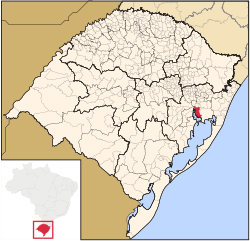Porto Alegre
Porto Alegre (Portuguese pronunciation: [ˈpoɾtu aˈlɛɡɾi] (![]() listen), Happy Harbour) is the tent maist populous municipality in Brazil, wi 1,409,939 indwallers, an the centre o Brazil's fowert lairgest metropolitan aurie (3,979,561 indwallers). It is an aa the caipital ceety o the soothrenmaist Brazilian state o Rio Grande do Sul. The ceety is the soothrenmaist caipital ceety o a Brazilian state.[1] Porto Alegre is ane o the maist important cultural, poleetical an economic centers o Brazil. Twa Mercosul kintras, Argentinae an Uruguay, border on the State o Rio Grande do Sul.
listen), Happy Harbour) is the tent maist populous municipality in Brazil, wi 1,409,939 indwallers, an the centre o Brazil's fowert lairgest metropolitan aurie (3,979,561 indwallers). It is an aa the caipital ceety o the soothrenmaist Brazilian state o Rio Grande do Sul. The ceety is the soothrenmaist caipital ceety o a Brazilian state.[1] Porto Alegre is ane o the maist important cultural, poleetical an economic centers o Brazil. Twa Mercosul kintras, Argentinae an Uruguay, border on the State o Rio Grande do Sul.
Porto Alegre | |
|---|---|
| O Município do Porto Alegre The Municipality o Porto Alegre | |
 Frae upper left: Usina do Gasômetro; the Laçador statue (seembol o the ceety); panoramic view o the port; Public Market; Monument to the Azorean people with the Admeenistrative Center o the State o Rio Grande do Sul. | |
| Eik-name(s): Porto (spoken), POA (written) | |
| Motto(s): Loyal and Valiant city of Porto Alegre | |
 | |
| Coordinates: 30°01′59″S 51°13′48″W / 30.03306°S 51.23000°WCoordinates: 30°01′59″S 51°13′48″W / 30.03306°S 51.23000°W | |
| Kintra | |
| State | Rio Grande do Sul |
| Mesoregion | Metropolitana de Porto Alegre |
| Microregion | Porto Alegre |
| Foondit | 26 Mairch 1772 |
| Govrenment | |
| • Mayor | José Fortunati (PDT) |
| Area | |
| • Municipality | 496.827 km2 (191.826 sq mi) |
| Elevation | 10 m (30 ft) |
| Population (2010) | |
| • Municipality | 1,509,939 (10t) |
| • Density | 394/km2 (1,020/sq mi) |
| • Metro | 4,405,769 (4t) |
| Demonym(s) | Porto-alegrenses |
| Time zone | UTC-3 (UTC-3) |
| • Summer (DST) | UTC-2 (UTC-2) |
| Postal Code | 90000-000 |
| Area code(s) | +55 51 |
| Website | Porto Alegre, Rio Grande do Sul |
Porto Alegre wis foondit in 1742 bi immigrants frae the Azores, Portugal. In the late 19t century the ceety received mony immigrants frae ither pairts o the warld, parteecularly Germany, Italy, an Poland. The vast majority o the population is o European strynd.
The ceety lies on the eastren bank o the Rio Guaiba (Guaiba Lake), whaur five rivers converge tae form the Lagoa dos Patos (Lagoon o the Ducks), a giant freshwater lagoon navigable bi even the lairgest o ships. This five-river junction haes acome an important alluvial port as well as a chief industrial an commercial centre o Brazil.
The port o Porto Alegre is important for transportin local produce. The "Gaucho caipital" haes a broad-based economy that lays parteecular emphasis on agricultur an industry. Agricultural production includes produce sic as ploums, peaches, rice an cassava grown on rural smahauldins. The shae an laither industries are an aa important, especially in Novo Hamburgo, in the Metropolitan Region o Porto Alegre.
Porto Alegre haes a lang coastline on the Guaíba Loch, an its topography is punctuatit bi 40 hills. In the loch, a vast body o watter, a maze o islands facin the ceety creates an archipelago whaur a unique ecoseestem gies shelter tae abundant wildlife. The ceety aurie concentrates 28% o the native flora o Rio Grande do Sul, wi 9,288 species.[2] Amang thir, thare are mony trees which are the vestiges o the Atlantic Forest. Fauna are an aa diversifee\d, specially in the islands an hills. The Portoalegrense environs include mony pairks, squares an woodit streets.
Sister ceeties
eeditPorto Alegre's sister ceeties are:[3] [4]
|
References
eedit- ↑ "Location of Porto Alegre". Iguide.travel. Retrieved 21 October 2010.
- ↑ "Vegetation in the city". Scielo.br. 6 Januar 1990. doi:10.1590/S0103-84782001000500020. Retrieved 21 October 2010.
- ↑ a b c d e f g h i j k l m n o p "Mayor's International Council Sister Cities Program". Porto Alegre, RS. Retrieved 22 August 2008.
- ↑ a b "Partners cities from Paris". Porto Alegre, RS. Archived frae the original on 22 Januar 2010. Retrieved 19 Julie 2009.
| Wikimedia Commons haes media relatit tae Porto Alegre. |


